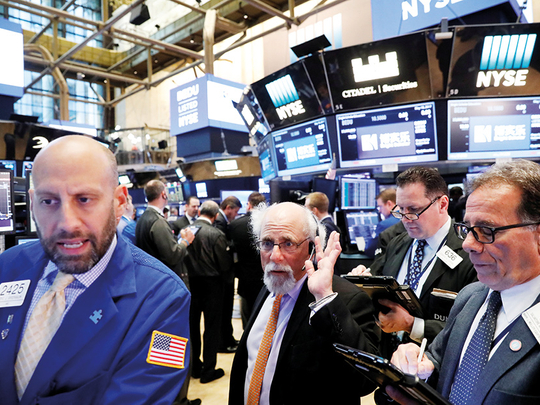
LONDON: Swirling uncertainty over US President Donald Trump’s political future saw world stocks extend their steepest fall in over six months on Thursday, though there were signs of stabilisation elsewhere as the dollar and gold steadied.
Reports that Trump had tried to intervene in an investigation into alleged Russian interference in last year’s US election and that his aides had numerous undisclosed contacts with Russian officials kept market tensions high.
Europe’s bourses dropped between 0.8 and 1.3 per cent as the selling pressure built again. Wall Street rebounded on opening having suffered its biggest thumping in over eight months on Wednesday. The Dow Jones Industrial Average was up 0.23% to 20653.78 at 7pm UAE time.
Rabobank strategist Michael Every said the key question was whether markets would “calm down, or panic more.” “The obvious point we’ve made before repeatedly is that Trump now has much less political capital to spend in the Capitol, and that makes Trumpflation far less likely. Yet things seem to be rapidly moving beyond that point, opening up other scenarios,” he said.
Though stocks flashed warning lights again, the dollar seemed to be going for the ‘calm down’ option.
It pulled out of a tailspin that had taken it to its lowest level in six months against other top currencies including the euro and the yen, though it remained wobbly.
A mini-recovery in Asia as Japan posted its best economic performance in a year ran out of steam in Europe, and it was limping sideways at $1.1136 per euro and buying 110.97 Japanese yen by the time US traders got to their desks.
Switzerland’s safe-haven franc hit its highest since November’s US election and Britain’s Brexit-bruised pound broke through the $1.30 barrier for the first time since late September after reassuring retail sales figures.
There was more support for the euro too as one of the European Central Bank’s most influential policymakers, Executive Board member Benoit Coeure said it should get on with paring back its stimulus once it is convinced inflation has recovered.
“Too much gradualism in monetary policy bears the risk of larger market adjustments when the decision is eventually taken,” Coeure told Reuters in an interview in which he also said the bank’s bond-buying programme was “not set in stone”.
The Gonald?
The political jitters coming out of the United States remained the dominant factor for traders, however.
Treasury yields seemed to be heading for a six-month low as they dropped back below 2.2 per cent and Germany’s and Europe’s benchmark government bond, the Bund, saw its yields dip to a fresh a two-week trough.
The allegations surrounding Trump have not only thrown doubt over the future of the pro-growth policies he promised, but have raised the possibility he could end up leaving the White House prematurely.
Trump says he is being given one of the toughest rides of any president in US history.
But a small number of his fellow Republicans called on Wednesday for an independent probe of possible collusion between his 2016 campaign team and Russia, and one even mentioned impeachment.
Wall Street futures pointed to more, albeit modest, falls for the S&P 500, Dow and Nasdaq markets when they reopen later. Wednesday’s dump, while substantial, had come after both the S&P and Nasdaq hit record highs on Tuesday.
“The more Trump gets bogged down in the impeachment debate and the issues surrounding that, it reduces the likelihood that you get anything meaningful in terms of fiscal stimulus — that’s the key factor here,” said Chris Scicluna, head of economic research at Daiwa Capital Markets in London.
Trump was not the only world leader under scrutiny.
Trouble mounted for Brazilian President Michel Temer, who was recorded discussing payments to silence testimony by a potential witness in the country’s biggest-ever graft probe, sources told media including Reuters.
Shares in Brazilian state-controlled oil company Petrobras {SA PBR. N} and mining giant Vale {SA VALE. K} plunged 16 and 9.5 per cent in pre-market trading respectively after the Brazilian real had dropped more than 1.2 per cent in local markets.
Among commodities, which have also been highly volatile in recent weeks but due mainly to supply and demand issues, there were steadier signals.
Brent oil futures slide back 60 cents to $51.60 a barrel after hitting a two-week high overnight on the back of an ongoing effort by Opec to cut production.
Safe-haven gold hovered near a two-week high prompted by the weaker dollar and the risk aversion gripping the broader markets.
Spot gold was at $1,260 an ounce having hit $1,263.02, its highest since May 1, in the previous session. It has been its biggest rally since Britain voted to quit the European Union last June.
“I would caution that the gold rally has been driven by political news and not necessarily fundamentals. Should the political storm die in Washington, the rally will lose steam,” said Jeffrey Halley, senior market analyst at OANDA.
— Reuters











